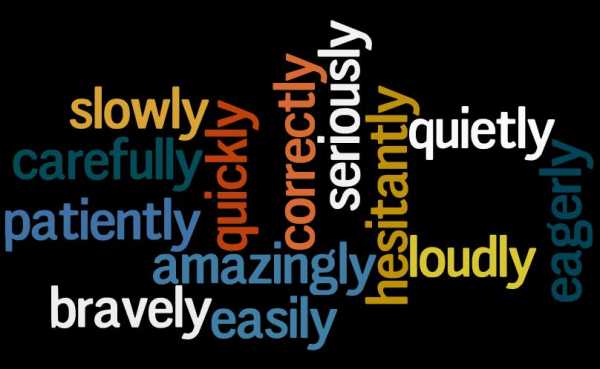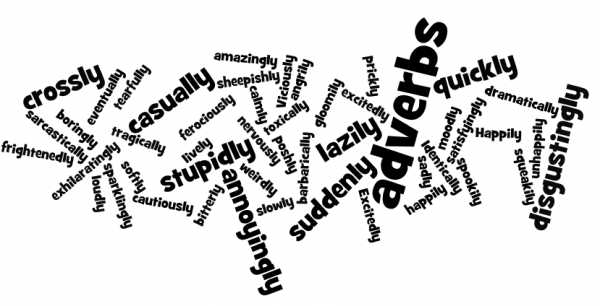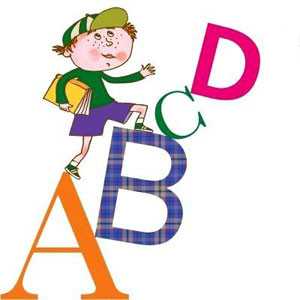Упражнения “Наречия образа действия” (с ответами). Наречия образа действия в английском языке упражнения
Упражнения "Наречия образа действия" (с ответами)

1. Выберите в скобках правильный вариант наречия образа действия.
- He is always dancing waltz so ... (passionate/passionately). (Он всегда танцует вальс так страстно.)
- David usually drives ... (fast/fastly) but ... (safe/safely). (Дэвид обычно водит машину быстро, но безопасно.)
- Your sister speaks Italian ... (fluent/fluently) and ... (good/well). (Твоя сестра говорит по-итальянски бегло и хорошо.)
- My son studies very ... (hard/hardly) and ... (diligent/diligently). (Мой сын учится очень много и прилежно.)
- If you need a supermarket, go ... (straight/straightly) ahead and turn left. (Если вам нужен супермаркет, идите прямо и поверните налево.)
- The salad tastes and smells ... (wonderful/wonderfully). (Салат имеет прекрасный вкус и запах.)
- I feel ... (good/well)! (Я хорошо себя чувствую!)
- Your wife looks ... (beautiful/beautifully) today! (Твоя супруга прекрасно выглядит сегодня!)
- The elderly often walk ... (heavy/heavily) and ... (slow/slowly). (Пожилые люди часто ходят тяжело и медленно.)
- The police arrived very ... (late/lately). (Полиция прибыла очень поздно.)
2. Перефразируйте предложения по образцу:
Например: The children were playing noisy games. (Дети играли в шумные игры.) – The children were playing noisily. (Дети шумно играли.)
- He gave her a gentle kiss. (Он подарил ей нежный поцелуй.)
- Jane is a fast swimmer. (Джейн – быстрая пловчиха.)
- We are quite good at playing basketball. (Мы довольно хорошо играем в баскетбол.)
- Brown gave me a friendly smile. (Мистер Браун подарил мне дружелюбную улыбку.)
- My boss is a hard worker. (Мой начальник трудолюбив.)
- This chicken has a strange taste. (Эта курица имеет странный вкус.)
- John is a terrible cook. (Джон – ужасный повар.)
- Miss White is a bad painter. (Мисс Уайт - плохой художник.)
- The perfume has a pleasant smell. (Духи имеют приятный аромат.)
- The students are sitting in the room. It is very silent there. (Студенты сидят в комнате. Там очень тихо.)
Ответы:
1.
- passionately
- fast, safely
- fluently, well
- hard, diligently
- straight
- wonderful
- good
- beautiful
- heavily, slowly
- late
2.
- He kissed her gently. (Он нежно поцеловал ее.)
- Jane swims fast. (Джейн быстро плавает.)
- We play basketball quite well. (Мы довольно хорошо играем в баскетбол.)
- Brown smiled to me friendly. (Мистер Браун приветливо мне улыбнулся.)
- My boss works hard. (Мой начальник много работает.)
- This chicken tastes strange. (Эта курица странная на вкус.)
- John cooks terribly. (Джон ужасно готовит.)
- Miss White paints badly. (Мисс Уайт плохо рисует.)
- The perfume smells pleasant. (Духи приятно пахнут.)
- The students are sitting in the room silently. (Студенты тихо сидят в комнате.)
Упражнения "Наречия образа действия" (с ответами) - 5.0 out of 5 based on 10 votes
Добавить комментарий
s-english.ru
Упражнения на наречия (с ответами)
1. Выберите в правой колонке подходящее наречие. Переведите предложения.
- It is raining … a. fast (быстро)
- He can speak Spanish … b. early (рано)
- Don’t cut yourself. Use the knife … c. gracefully (грациозно)
- Sorry, I don’t understand you. Can you speak …? d. quietly (тихо)
- Modern cars go very … e. heavily (сильно, тяжело)
- During the war my grandmother worked very ... f. carefully (осторожно)
- If you get up …, you’ll have a successful day. g. brightly (ярко)
- My kids never make noise, they usually play … h. fluently (бегло)
- It’s very hot today. The sun is shining … i. hard (много, тяжело)
- She moves like a cat: very … j. slowly (медленно)
2. Выберите в скобках подходящее слово.
- The bus moved very … (slow/slowly) and I arrived home late. (Автобус двигался очень медленно, и я прибыл домой поздно.)
- Miss Jones ran … (quick/quickly) to the chemist’s. (Мисс Джонс быстро побежала в аптеку.)
- I’m afraid I wrote the test very … (bad/badly). (Боюсь, я написал тест очень плохо.)
- She drives the car quite … (good/well). (Она водит машину довольно хорошо.)
- Dad looked at me … (angry/angrily). (Папа посмотрел на меня сердито.)
- Mr. Potter was … (deep/deeply) touched by our greetings. (Мистер Поттер был глубоко тронут нашими поздравлениями.)
- We … (hard/hardly) know each other. (Мы почти не знаем друг друга.)
- The Internet is … (wide/widely) used all over the world. (Интернет широко используется по всему миру.)
- Hurry up, kids! It’s … (near/nearly) midnight. (Поторопитесь, дети! Уже почти полночь.)
- The police officer examined the car … (close/closely). (Полицейский тщательно осмотрел машину.)
3. Поставьте наречие из скобок в нужное место в предложении. Переведите.
Н-р: I go jogging in the morning. (always – всегда) – I always go jogging in the morning. (Я всегда хожу на пробежку утром.)
- I have a salad for lunch. (usually – обычно)
- John is rude to his parents. (never – никогда)
- Mary watches horror films. (sometimes – иногда)
- They go abroad for their holidays. (often – часто)
- We drink strong coffee. (hardly ever – очень редко)
- I am impressed by music. (rarely – редко)
- She will remember this accident. (always – всегда)
- The patient is sleeping after the operation. (probably – возможно)
- The week is over. (finally – наконец-то)
- I go to the gym twice a week. (generally – в основном)

Ответы:
1.
- е (Идет сильный дождь.)
- h (Он умеет бегло говорить по-испански.)
- f (Не порежь себя. Пользуйся ножом осторожно.)
- j (Простите, я вас не понимаю. Вы можете говорить медленно?)
- a (Современные машины ездят очень быстро.)
- i (Во время войны моя бабушка очень тяжело работала.)
- b (Если ты встанешь рано, у тебя будет удачный день.)
- d (Мои дети никогда не шумят, обычно они играют тихо.)
- g (Сегодня очень жарко. Солнце ярко светит.)
- c (Она двигается как кошка: очень грациозно.)
2.
- slowly
- quickly
- badly
- well
- angrily
- deeply
- hardly
- widely
- nearly
- closely
3.
- I usually have a salad for lunch. (Обычно я ем салат на обед.)
- John is never rude to his parents. (Джон никогда не грубит родителям.)
- Mary sometimes watches horror films. (Мэри иногда смотрит фильмы ужасов.)
- They often go abroad for their holidays. (Они часто ездят в отпуск заграницу.)
- We hardly ever drink strong coffee. (Мы очень редко пьем крепкий кофе.)
- I am rarely impressed by music. (Меня редко впечатляет музыка.)
- She will always remember this accident. (Она всегда будет помнить этот несчастный случай.)
- The patient is probably sleeping after the operation. (Пациент возможно спит после операции.)
- The week is finally over. (Неделя,наконец-то, закончилась.)
- I generally go to the gym twice a week. (В основном, я хожу в тренажерку дважды в неделю.)
Упражнения на наречия (с ответами) - 4.7 out of 5 based on 65 votes
Добавить комментарий
s-english.ru
Упражнения по теме "Наречия в английском языке"
2018-04-06Автор: Елизавета Морозова
Рубрика: Грамматика
Упражнение 1:
- He waited (silent /silently) for the girl-friend.
- Tom is very (kind /kindly). He can always help me.
- The thief (quiet /quietly) took the picture and left the museum.
- The fireman (brave /bravely) rescued the people.
- It was a midnight, and I heard a (strange /strangely) noise in the kitchen.
- I can speak some foreign languages very (good /well).
- My mum tells me that I sing (bad /badly).
- The work that Kelly gave me was (easy /easily).
- The boy (selfish /selfishly) kept the sweet for himself.
- She looked (angry /angrily) at me when I arrived late.
Упражнение 2:
Образуйте наречия от прилагательных:
- Curious
- Heavy
- Light
- Natural
- Realistic
- Smooth
- Sole
- Obvious
- Loud
- Fantastic
Упражнение 3:
- Music / extremely / is / that / loud
- They / English / fluently / quite / speak
- Instructions / these / somewhat / are / confusing
- He / quickly / types / really
- The / Jenny / well / plays / very / piano
- The / we / news / closely / follow / fairly
- Eats / unhealthily / very / Sarah
- Hardly / I / can / when / understand / people / English / quickly / speak
- Nearly / I / my mom’s / yesterday / birthday / forgot
- Unfortunately / crashed / his new car / last Tuesday / he
Теория по теме
Онлайн тест по теме
Ответы:
Упражнение 1:
- He waited silently for the girl-friend.
- Tom is very kind. He can always help me.
- The thief quietly took the picture and left the museum.
- The fireman bravely rescued the people.
- It was a midnight, and I heard a strange noise in the kitchen.
- I can speak some foreign languages very well.
- My mum tells me that I sing badly.
- The work that Kelly gave me was easy.
- The boy selfishly kept the sweet for himself.
- She looked angrily at me when I arrived late.
Упражнение 2:
- Curiously
- Heavily
- Lightly
- Naturally
- Realistically
- Smoothly
- Solely
- Obviously
- Loudly
- Fantastically
Упражнение 3:
- That music is extremely loud.
- They speak English quite fluently.
- These Instructions are somewhat confusing.
- He types really quickly.
- Jenny plays the piano very well.
- We follow the news fairly closely.
- Sarah eats very unhealthily.
- I can hardly understand when English people speak quickly.
- I nearly forgot my mom’s birthday yesterday.
- Unfortunately he crashed his new car last Tuesday.
Понравилась статья? Поделись с друзьями:
Вконтакте
Мой мир
Одноклассники
Google+
lizasenglish.ru
НАРЕЧИЯ В АНГЛИЙСКОМ ЯЗЫКЕ - упражнения
Сегодня выполним несколько упражнений по теме НАРЕЧИЯ В АНГЛИЙСКОМ ЯЗЫКЕ. Но вначале рекомендую ознакомиться с теоретическим материалом Правила образования и употребления наречий в английском.
На сайте есть также упражнения на степени сравнения наречий и упражнения на место наречий в предложении.
Упражнения на наречия.
Предлагаю Вам 5 вариантов проверочной работы на образование и употребление наречий.
Вариант 1
Упражнение 1. Создайте наречия от следующих прилагательных.
Nice, honest, easy, awful, fast, comic, high, good, agreeable, serious.
Упражнение 2. Напишите степени сравнений от следующих наречий, если это возможно.
Little, fast, simply, interestingly, now.
Упражнение 3. Подчеркните правильный вариант ответа.
- It is wide/widely known that healthy eating habits prolong our life.
- I think high/highly of my German teacher.
- I can dive deep/deeply.
- I can hard/hardly breathe.
- This steak smells good /well.
Упражнение 4. Напишите степени сравнения.
- Jim speaks English (fluently) __________ now than last year.
- Sandy greeted me (politely) ______________of all.
- Milla smiled (happily) ___________ than before.
- Alise dances (gracefully) _____________ of all.
- Could you write (clearly) ______________?
- The Nile is (немного длиннее) than the Amazon.
- Moscow is the (определенно самый большой) city in the world.
Упражнение 5. Переведите на английский.
- Чем больше ты куришь, тем скорее ты умрешь.
- Чем больше ты упражняешься, тем здоровее ты будешь.
- Чем больше ты знаешь, тем лучше.
Вариант 2
Упражнение 1. Создайте наречия от следующих прилагательных.
extreme, difficult, pretty, wonderful, early, fantastic, hard, bad, simple, graceful.
Упражнение 2. Напишите степени сравнений от следующих наречий, если это возможно.
Much, nicely, today, high, immensely
Упражнение 3. Подчеркните правильный вариант ответа.
- Mike feels good / well.
- Planes fly high/highly in the sky.
- She opened her eyes wide/widely.
- The European Union is deep/deeply concerned (озабочен) about terrorism.
- The book is hard/hardly worth reading.
Упражнение 4. Напишите степени сравнения.
- Planes can fly (high) ___________ than birds.
- Now, Samuel drives (carefully) __________ than before.
- Jerry can run (fast) __________ than Johny.
- Our team played (badly) ___________ of all.
- Lisa worked (hard) ___________ than ever before.
- Mumbai is a (немного больше) than Sao Paulo.
- Seoul is the (определенно самый густонаселенный – populated) city in the world.
Упражнение 5. Переведите на английский.
- Чем больше ты знаешь, тем больше ты забываешь.
- Чем больше ты ешь овощей, тем здоровее ты будешь.
- Чем быстрее ты едешь, тем хуже.
Вариант 3
Упражнение 1. Создайте наречия от следующих прилагательных.
fierce, careless, crazy, critical, fast, dramatic, high, bad, horrible, clumsy.
Упражнение 2. Напишите степени сравнений от следующих наречий, если это возможно.
Far, deep, loudly, wonderfully, then
Упражнение 3. Подчеркните правильный вариант ответа.
- Robin looks sad / sadly.
- The members of the committee had wide/widely differing opinions.
- Nick is a now a high/highly paid expert.
- Our parents are deep/deeply concerned (озабочены) about our future.
- I hardly/hard know her.
Упражнение 4. Напишите степени сравнения.
- The boss arrived (early) _________ than expected.
- The children walked (slowly) _________ than the rest of the people.
- My relatives talked (loudly) _________ than the other guests.
- Sam hit his arm (hard) _________ than before.
- The Polish athlete ran (fast) _________ than the other runners.
- The coast of Canada is (намного длиннее) than the coast of Indonesia.
- London has (определенно самый загруженный — busy ) airport in the world.
Упражнение 5. Переведите на английский.
- Чем больше ты учишь, тем больше ты знаешь.
- Чем больше ты ешь фруктов, тем здоровее ты будешь.
- Чем медленнее ты едешь, тем лучше.
Вариант 4
Упражнение 1. Создайте наречия от следующих прилагательных.
brave, fluent, happy, careful, far, fantastic, deep, good, terrible, witty.
Упражнение 2. Напишите степени сравнений от следующих наречий, если это возможно.
Bad, proudly, very, wide, gracefully
Упражнение 3. Подчеркните правильный вариант ответа.
- His hamburger tastes awful / awfully.
- She is a high/highly experienced (опытная) teacher.
- Plants are wide/widely used in pharmaceutical industry.
- Jenifer was deep/deeply offended.
- I worked hard/hardly.
Упражнение 4. Напишите степени сравнения.
- Jimmy threw the ball (far) _________ than Pete.
- We answered all the questions (well) _________ than the other students.
- Our new teacher explains the exercises (badly) _________ than our old teacher.
- The new mechanic checked the car (thoroughly) _________ than the old mechanic.
- Every morning I get up 10 minutes _________ (early) than my sister.
- Los Angeles is a (намного дальше) south than San Francisco.
- Jane is (определенно самая умная) person in the company.
Упражнение 5. Переведите на английский.
- Чем больше ты забываешь, тем меньше ты знаешь.
- Чем меньше ты куришь, тем дольше ты проживешь.
- Чем медленнее ты едешь, тем хуже.
Вариант 5
Упражнение 1. Создайте наречия от следующих прилагательных.
immense, loud, angry, awful, early, historic, wide, good, possible, dangerous.
Упражнение 2. Напишите степени сравнений от следующих наречий, если это возможно.
Good, quickly, hard, crazily, inside
Упражнение 3. Подчеркните правильный вариант ответа.
- Dog food smell so terrible/terribly.
- Their front door was wide/widely open.
- Throw it as high/highly as you can.
- They dug the hole deep/deeply.
- He will hard/hardly have time for that.
Упражнение 4. Напишите степени сравнения.
- Please, speak __________ (clearly).
- Bob ran ___________ (slowly) than his classmates.
- Jo is plays _________ (well) of all the team.
- We answered all the questions (well) _________ than the other students.
- Our new teacher explains the exercises (badly) _________ than our old teacher.
- France is (намного более популярна) with tourists than the USA.
- This is (определенно самая лучшая) pasta I’ve ever had!
Упражнение 5. Переведите на английский.
- Чем больше ты знаешь, тем меньше ты говоришь.
- Чем меньше алкоголя ты пьешь, тем дольше ты проживешь.
- Чем больше ты ешь, тем толще становишься.
Понравилось? Сохраните на будущее и поделитесь с друзьями!
grammar-tei.com
Наречие в английском языке. Упражнения (для начинающих)
Приступаем к выполнению упражнений по теме «Наречие в английском языке» (уровень базовый). Однако, для начала, давайте проверим, как хорошо вы запомнили теорию. Выполните небольшой тест и будем тренироваться дальше.
Тест 1. Выберите правильный вариант.
Загрузка ... Загрузка ... Загрузка ... Загрузка ... Загрузка ... Загрузка ... Если ваши ответы совпадают с мнением БОЛЬШИНСТВА, то пропустите упражнение 2, и переходите к упражнению 3. Если нет, повторите тему «Наречие в английском языке»Комментарий. Вы найдете правильные ответы — НИЖЕ.
Наречие в английском языке. Упражнения (уровень базовый)
Упражнение 2. Вставьте наречие или прилагательное.
- Peter is a (quick, quickly) learner.
- He always does his homework (quick, quickly).
- He listens to his teachers (careful, carefully).
- When he crosses the street he’s always very (careful, carefully) too.
- She sings (beautiful, beautifully).
- He’s got a (beautiful, beautifully) voice.
- He studies (hard, hardly).
- He (hard, hardly) studies.
- Ann is a (wonderful, wonderfully) girl!
- She always looks (wonderful, wonderfully).
- My mother looked at me (cold, coldly).
- It is (cold, coldly) today.
- My brother has a (loud, loudly) voice.
- The brother shouted (loud, loudly).
Упражнение 3. Choose adjective or adverb.
- She was crying (quiet/quietly).
- You can do it (easy/easily).
- You speak (well/good) English. Where did you study?
- The weather is (terrible/terribly). Don’t go out.
- It was (easy/easily) to understand the book and make the report on it.
- He has always been (angry/angrily).
- You should work (hard, hardly) if you want to succeed.
- This rule is (well/good ). Remember it.
- He ate his breakfast (quick/quickly) and went to school.
- Be (quick/quickly). The taxi has arrived.
- The car drove very (slow/slowly).
- I speak French (bad/badly). Let’s speak English.
- Why did you speak to me so (angry/angrily)?
- Say this word (correct/correctly).
- He is (good, well) at literature and history.
Упражнение 4. Выпишите наречия-антонимы. Запомните их.
1. hard, carefully, well, early, fast, loudly, happily
2. sadly, badly, slowly, quietly, easily, carelessly, late
Упражнение 5. Переведите на английский язык (уровень базовый).
1. Я быстро бегаю. 2. Она хорошо рисует. 3. Он плохо знает английский. 4. Поздняя осень. (It is …) 5. Не приходи поздно. 6. Я не видел его последнее время. 7. Я едва его помню. 8. Он упорно работает. 9. Ранняя весна. 10. Я не люблю вставать рано.
Если вы немного разобрались с наречиями, то можно идти дальше. Будем изучать «Степени сравнения наречий» (уровень базовый).
* * *
Правильные ответы:
- He speaks French slowly.
- Mr. Green drives fast. (слова fastly — не существует. Это ловушка!)
- I went to bed late (поздно) yesterday.
- It is interesting to learn languages. (после глагола BE)
- I always feel nervous before exams. (после глагола FEEL)
englishinn.ru
Упражнения, наречия в английском языке + ответы
1. Распределите следующие наречия по колонкам в зависимости от того, на какой вопрос они отвечают.
loudly – outside — tomorrow — early – downstairs — always — selfishly – never – slowly – before – now — noisily – here — elegantly – recently- abroad – usually – away — happily – well – often — quickly – constantly – then – wildly – upstairs — gently – again – once — soon – politely – rarely — yesterday – brilliantly — sometimes — inside
| КАК? | КОГДА? КАК ЧАСТО? | ГДЕ? КУДА? |
2. Поставьте наречия из скобок в правильное место в предложениях.
Например: I agree with you. (fully) – I fully agree with you. (Я полностью согласен с тобой.)
- 1. It was hot. (very) (Было жарко.)
- 2. We felt nervous before the wedding. (extremely) (Мы нервничали перед свадьбой.)
- 3. Julia is tired after the gym. (really) (Джулия устала после тренажерного зала.)
- 4. My dad’s car is old. (quite) (Папина машина старая.)
- 5. The nights are long in winter. (rather) (Ночи длинные зимой.)
- 6. The new film was good. (fairly) (Новый фильм был хороший.)
- 7. It’s dangerous to drive so fast. (always) (Так быстро ездить опасно.)
- 8. He meets intelligent people at work. (rarely) (Он встречает умных людей на работе.)
- 9. The tickets are expensive here. (never) (Билеты здесь дорогие.)
- 10. My girlfriend is late. (constantly) (Моя подруга опаздывает.)
- 11. Nick will win in the game. (probably) (Ник победит в игре.)
- 12. She knows the answer. (definitely) (Она знает ответ.)
- 13. The lunch is ready. (nearly) (Обед готов.)
- 14. There are three tomatoes left. (only) (Осталось три помидора.)
- 15. He loves his sons. (certainly) (Он любит своих сыновей.)
3. Образуйте из прилагательных в скобках наречия, поставьте в предложения и переведите.
1. The firemen fought with the fire … . (heroic)
2. You should stretch your arms … . (gentle)
3. Mr. Black apologized … . (public)
4. The taxi stopped … . (unexpected)
5. She could … open the door. (easy)
6 My favourite newspaper is published … . (week)
7. The monkeys played … in the cage. (noisy)
8. I am … sorry for that incident. (awful)
9. Ted wrote the test … . (bad)
10. The orchestra played too … . (loud)
Ответы:
1.
| КАК? | КОГДА? КАК ЧАСТО? | ГДЕ? КУДА? |
| loudly (громко) | tomorrow (завтра) | outside (снаружи) |
| selfishly (эгоистично) | early (рано) | downstairs (внизу) |
| slowly (медленно) | always (всегда) | here (здесь) |
| noisily (громко) | never (никогда) | away (прочь) |
| elegantly (элегантно) | before (до, перед) | upstairs (наверху) |
| happily (счастливо) | now (сейчас) | inside (внутри) |
| well (хорошо) | often (часто) | abroad (заграницу) |
| quickly (быстро) | constantly (постоянно) | |
| wildly (дико) | then (затем) | |
| gently (нежно) | again (снова) | |
| politely (вежливо) | once (однажды) | |
| brilliantly (блестяще) | soon (вскоре) | |
| yesterday (вчера) | ||
| sometimes (иногда) | ||
| recently (недавно) | ||
| usually (обычно) | ||
| rarely (редко) |
2.
1. It was very hot. (Было очень жарко.)
2. We felt extremely nervous before the wedding. (Мы крайне нервничали перед свадьбой.)
3. Julia is really tired after the gym. (Джулия очень устала после тренажерного зала.)
4. My dad’s car is quite old. (Папина машина довольно старая.)
5. The nights are rather long in winter. (Ночи достаточно длинные зимой.)
6. The new film was fairly good. (Новый фильм был довольно хороший.)
7. It’s always dangerous to drive so fast. (Так быстро ездить всегда опасно.)
8. He rarely meets intelligent people at work. (Он редко встречает умных людей на работе.)
9. The tickets are never expensive here. (Билеты здесь никогда не бывают дорогими.)
10. My girlfriend is constantly late. (Моя подруга постоянно опаздывает.)
11. Nick will probably win in the game. (Ник возможно победит в игре.)
12. She definitely knows the answer. (Она точно знает ответ.)
13. The lunch is nearly ready. (Обед почти готов.)
14. There are only three tomatoes left. (Осталось лишь три помидора.)
15. He certainly loves his sons. (Он, конечно же, любит своих сыновей.)
3.
1. heroically (Пожарные сражались с огнем героически.)
2. gently (Нужно мягко растягивать руки.)
3. publicly (Мистер Блэк публично извинился.)
4. unexpectedly (Такси неожиданно остановилось.)
5. easily (Она смогла с легкостью открыть дверь.)
6. weekly (Моя любимая газета публикуется еженедельно.)
7. noisily (Обезьянки шумно играли в клетке.)
8. awfully (Я ужасно сожалею о том инциденте.)
9. badly (Тэд плохо написал тест.)
10. loudly (Оркестр играл слишком громко.)
Смотрите также:
Упражнение на «too, also, either, neither»
упражнение на still, yet или already
online-teacher.ru
Упражнения “Наречия образа действия” (с ответами)
1. Выберите в скобках правильный вариант наречия образа действия.
He is always dancing waltz so… (passionate/passionately). (Он всегда танцует вальс так страстно.) David usually drives… (fast/fastly) but… (safe/safely). (Дэвид обычно водит машину быстро, но безопасно.) Your sister speaks Italian… (fluent/fluently) and… (good/well). (Твоя сестра говорит по-итальянски бегло и хорошо.) My son studies very… (hard/hardly) and… (diligent/diligently). (Мой сын учится очень много и прилежно.) If you need a supermarket, go… (straight/straightly) ahead and turn left. (Если вам нужен супермаркет, идите прямо и поверните налево.) The salad tastes and smells… (wonderful/wonderfully). (Салат имеет прекрасный вкус и запах.) I feel… (good/well)! (Я хорошо себя чувствую!) Your wife looks… (beautiful/beautifully) today! (Твоя супруга прекрасно выглядит сегодня!) The elderly often walk… (heavy/heavily) and… (slow/slowly). (Пожилые люди часто ходят тяжело и медленно.) The police arrived very… (late/lately). (Полиция прибыла очень поздно.)
2. Перефразируйте предложения по образцу:
Например: The children were playing noisy games. (Дети играли в шумные игры.) – The children were playing noisily. (Дети шумно играли.)
He gave her a gentle kiss. (Он подарил ей нежный поцелуй.) Jane is a fast swimmer. (Джейн – быстрая пловчиха.) We are quite good at playing basketball. (Мы довольно хорошо играем в баскетбол.) Brown gave me a friendly smile. (Мистер Браун подарил мне дружелюбную улыбку.) My boss is a hard worker. (Мой начальник трудолюбив.) This chicken has a strange taste. (Эта курица имеет странный вкус.) John is a terrible cook. (Джон – ужасный повар.) Miss White is a bad painter. (Мисс Уайт – плохой художник.)
The perfume has a pleasant smell. (Духи имеют приятный аромат.) The students are sitting in the room. It is very silent there. (Студенты сидят в комнате. Там очень тихо.)
Ответы:
1.
Passionately Fast, safely Fluently, well Hard, diligently Straight Wonderful Good Beautiful Heavily, slowly Late
2.
He kissed her gently. (Он нежно поцеловал ее.) Jane swims fast. (Джейн быстро плавает.) We play basketball quite well. (Мы довольно хорошо играем в баскетбол.) Brown smiled to me friendly. (Мистер Браун приветливо мне улыбнулся.) My boss works hard. (Мой начальник много работает.) This chicken tastes strange. (Эта курица странная на вкус.) John cooks terribly. (Джон ужасно готовит.) Miss White paints badly. (Мисс Уайт плохо рисует.) The perfume smells pleasant. (Духи приятно пахнут.) The students are sitting in the room silently. (Студенты тихо сидят в комнате.)
.
Упражнения “Наречия образа действия” (с ответами)
englishtopic.ru






